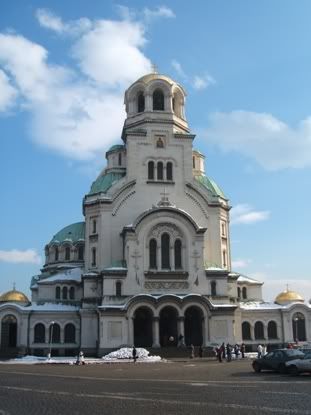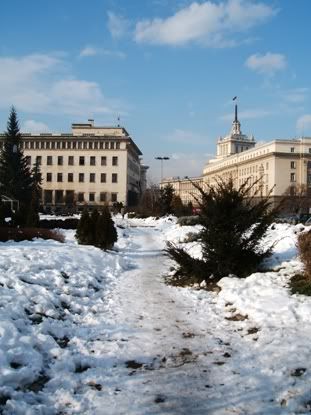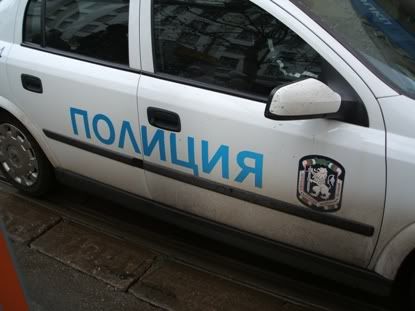Extended stay in Sofia
Firstly, none of the staff speak English. A few different people have come round checking tickets but they aren’t wearing any kind of uniform. There’s a short man with thinning grey hair, a youngish woman and another large bloke carrying a stick. I’ve also been passed by a couple of uniformed police officers and noticed one guy in green trousers with a gun strapped around his waste, clearly visible to anyone nearby.
Secondly, there’s the fact that I didn’t sleep at all last night. After missing the train I wanted to take at 7.30pm by one minute because of a late taxi, I had nowhere to sleep and spent around eight hours at the cheapest internet café in Sofia (under £5 for the whole stay). It was a surreal experience and surprisingly I wasn’t the only person there: several gaming freaks were online until the early hours.
Spending a day in the train rather than a night is very annoying. Now I’ll only have one day in Bucharest, when I’d wanted to have two like I’ve been doing with all the other places. It’s not the end of the world though and hopefully this train will be OK…
But what about Sofia? The busy capital of Bulgaria was definitely a fascinating place and I had great guidance from my host Dejan, one of the kindest guys I’ve ever met. He’s a friend of someone I know from the German course last year, who unfortunately wasn’t around himself this week. It was Dejan’s suggestion to visit the internet place: his brother was coming home that night so there was no space for me there anymore and nearly all his friends were out of town.

On the first day I saw just about everything there is to see. Sofia has many beautiful churches, due to the Bulgarian people’s enslavement by the Ottoman Empire for 800 years. Many of the Orthodox or Catholic ones are build underground because the Turkish rulers decreed that their churches had to be the tallest. The Alexander Nevsky Cathedral, a main landmark, was grand and impressive, but what wasn’t so impressive was the swarm of beggars clamouring for loose change all around it. One woman even had the nerve to follow us down the street for a couple hundred metres and only went away when given money. It’s such a shame that people need to behave this way simply in order to survive.
Another point of interest was Sloveikov Square, an area of market stalls with an infamous reputation. Apparently you can find any book, film or computer software programme among the low tables, even if it means pirate copies of unreleased movies. From that perspective it’s similar to London, where shady vendors carrying rucksacks of dodgy DVDs make their living from selling under the table in pubs or other places they can escape the eye of the law.

Someone told me there had been snow at home and there also was in Sofia a couple of days before I arrived. Temperatures were sub-zero and the white stuff everywhere, although increasingly degenerated to a dangerous icy slush in many places. Not wanting my travel insurance premium to increase, I had to tread carefully to avoid slipping – and it was especially risky when hurrying around before missing that train last night.
Bulgaria must have the best currency name in all Europe, if not the world: Lev and Stotinki. A popular joke is to imagine the Bulgarian version of rapper 50 Cent, who would be called 50 Stotinki – a much better name in my opinion.
A minor culture shock I had came from Bulgarian head gesturing. I’m used to a nod signifying ‘yes’ and a shake meaning ‘no’, but they don’t use nodding here. Instead they have two slightly different ways of shaking the head from side to side. It seemed strange to me when, for example, a waitress shook her head after we asked to pay at a restaurant – I thought she was refusing. But I got used to it eventually and there’s an interesting story about how this mannerism developed historically.
During the Turkish rule, when many innocent civilians were being cruelly slaughtered for the reason of religion, it was common for Ottoman soldiers to ask the question “are you Catholic?” They would do so while holding a knife, sword or spear to the victim’s throat, so when they nodded their head in affirmative they met an untimely end. So to avoid this the current system of shakes for both yes and no was adopted.
Enforcement of tyrannical laws such as this during the slavery period were common, but today the situation is apparently very different regarding police. They are often brutal in their methods, but that’s only when they’re actually doing their jobs. Most of the time they are moaning about bad pay and not upholding the law in the ways they should. This seems to be a bad situation of two extremes: they either do absolutely nothing or go too far. And, similar to London, there’s also a lot of unfair discrimination towards young people.

As well as seeing Sofia’s historical heritage, I also visited what is very much a symbol of the modern age. ‘Sofialand’, a large entertainment complex just outside the city, has arcades, bowling, food, drink and a small fairground at the disposal of visitors. It seemed to be quite a popular place; there were lots of people around even though much of the outdoor area was closed and this is a time of year when many are on holiday.
My train had a couple more stops, including quite a long one we only just left. Outside I can see endless countryside, which is fairly pleasant as these things go, and bright sunshine is giving a summary look to the scenery. Haven’t crossed the border yet and I think there’s at least another three hours to go before reaching Bucharest, but it’s hard to be sure because of the language barrier problems.





0 Comments:
Post a Comment
<< Home